Create a better world through contemplative activism! Please join The 787 Collective of Education Beyond the Walls at Austin Seminary in partnership with Austin non-profit Six Square for an in-person workshop on the sacred practice of creatio divina. This workshop offers attendees tools for integrating spiritual care with anti-racism advocacy. Haitian-American multi-disciplinary artist Carmelle Beaugelin Caldwell will guide lay and clergy faith leaders, activists, community leaders, social justice advocates, entrepreneurs, artists, and seminarians in somatic exercise, art-making, and reflection to deepen relationship with self, community, and the Divine. Each attendee will leave feeling refreshed and equipped to share practices for spiritual renewal and contemplative activism with their respective communities. Best of all, registration supports a worthy cause: your donation will benefit Six Square’s mission to preserve Austin’s Black Cultural District. Read more about the mission, vision, and history of Six Square here. Attendees will receive continental breakfast, refreshments, and Creatio Divina art kits.
IN PERSON
Space is limited. Registration closes at 5:00 p.m. on October 6.
Date: October 14, 9:00 a.m. – 1:00 p.m.
Location: Wright Hall, Austin Presbyterian Theological Seminary
Audience: Lay and clergy faith leaders, community leaders, social justice advocates/activists, entrepreneurs, artists, congregations, and seminarians.
Cost: Make a tangible step toward change. Because this workshop encourages attendees to practice anti-racism, we invite you to join us in donating $15, $30, or $50 to Austin non-profit Six Square. Your donation will directly support Six Square’s mission to promote and preserve African American cultural heritage in Austin through a variety of initiatives, including educational programs, community events, and preservation efforts of historic sites. As you complete your registration, simply choose the donation amount that feels right for you and follow the easy steps to complete your transaction securely. Your donation will not only help to preserve African American cultural heritage in Austin for generations to come, but it will also make a statement that you stand with us in supporting diversity and inclusion in our community.
Day-of Schedule:
9:00 a.m. – 9:30 a.m. — Continental Breakfast
9:30 a.m. – Noon — Workshop and Six Square Presentation
Noon – 1:00 p.m. — Optional Networking Hour
More information here.








